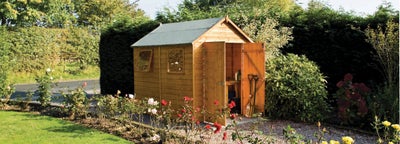Investing in a garden shed is a big decision that holds long-term value for your outdoor space. This ultimate guide explores Mercia's shed ranges, covering various sizes, materials, shapes, and costs, empowering you to make an informed decision and find the ideal shed that will serve you for years to come.
What will your shed be used for?
When deciding which shed to purchase, it is essential to consider its intended purpose. Are you searching for efficient garden storage solutions? Do you aspire to create a personal hobby room or a productive home office? Maybe you yearn for a tranquil sanctuary, away from the chaos of daily life. To guide you in the right direction, we have outlined the most common uses for garden buildings, ensuring you make an informed decision.
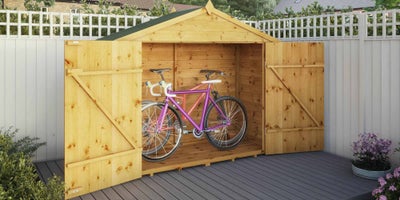
Storage
If you're seeking a reliable solution to store your garden equipment and tools, a garden shed is the perfect choice. With a wide range of sizes, shapes, and materials available, you'll find a shed that fits your budget. For smaller items or limited outdoor space, explore options like bike stores and mower stores for efficient garden storage.
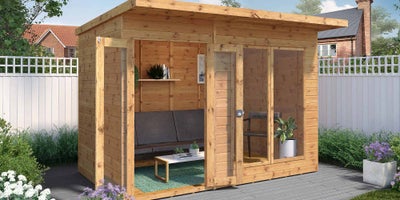
Outdoor living
To expand your living space during the warmer months, a summerhouse may be more suited to your needs. These versatile and stylish buildings allow you to enjoy your garden in shelter and comfort. However, if you require a garden building which can be used all year round, then opt for a log cabin or insulated garden room. These buildings benefit from thick log boards and insulated walls respectively, ensuring a cosy environment even in the winter months.
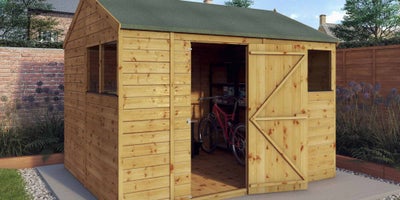
Work and hobbies
Our large wooden sheds and workshops offer ample space for DIY projects, hobbies and home offices. With sizes up to 20ft x 10ft and various material options, you can transform these large buildings into your personal workshop or hobby room. For a year-round home office, consider an insulated garden room or log cabin.
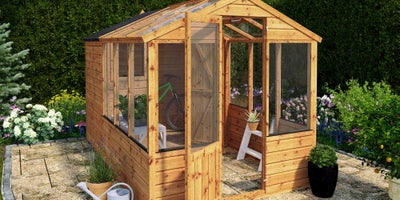
Growing
For storing gardening tools and equipment, a garden shed provides the perfect solution, with options for shelving or storing larger equipment. However, if you require a shelter with the ideal growing conditions for your flowers and plants, explore Mercia’s greenhouses! If you desire both storage space and a sheltered growing area, our combi greenhouses offer the best of both worlds—a secure tool storage space and a spacious area for plant cultivation.
What size shed do you need?
Mercia offer a diverse range of sizes, catering to various needs. From a compact 5ft x 3ft bike store to a spacious 20ft x 10ft workshop, there's a shed to suit every requirement. Unsure about the ideal size? Consider the equipment or tools to be stored and ensure generous space for manoeuvring items in and out of the shed doors. It's crucial to determine the shed's placement inyour garden to avoid selecting a size that is too large. Remember, the dimensions provided are approximate measurements and act as a general starting point. For example, a 5ft x 7ft shed may have precise measurements of 4.8ft x 6.9ft.
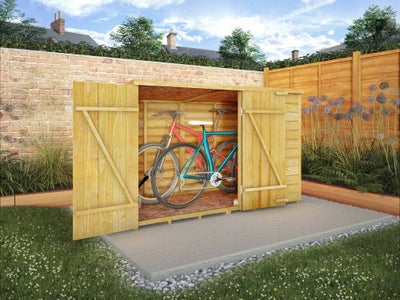
Small storage: 4ft x 3ft - 6ft x 3ft
Designed specifically for tools, bicycles, or lawn mowers, our small storage options are perfect for storing smaller belongings. They are also an excellent choice for those with limited outdoor space.
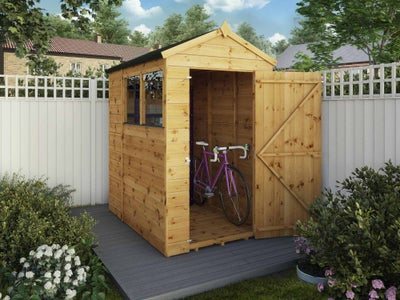
Small sheds: 6ft x 4ft - 8ft x 4ft
If you need to store bicycles, tools, or small equipment without occupying too much garden space, consider our small sheds. Enhance internal storage space with shelving and tool racks.
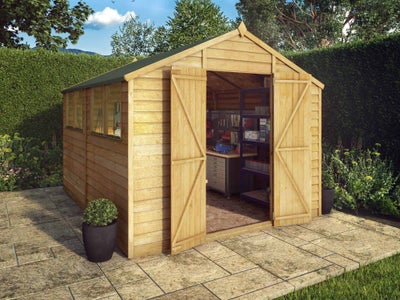
Medium storage: 8ft x 6ft - 12ft x 8ft
Ideal for bulky items like garden furniture, lawnmowers, tools, and gardening equipment, medium sheds provide ample storage. They are perfect for spacious gardens, offering a secure and tidy storage solution.
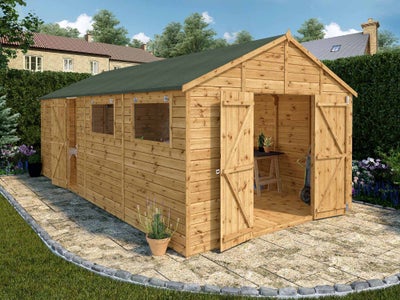
Large sheds & workshops: 12ft x 10ft - 20ft x 10ft
Providing the perfect space to work in regularly or store large equipment, our large sheds and workshops are ideal for those with sizeable gardens. A robust structure and sturdy tongue and groove floor ensures that your belongings are kept safe and secure.
Location
When selecting the size of your shed, it is crucial to consider its placement in your garden. Some things you’ll need to consider:
- The space around your shed; you must leave at least 60cm around your shed for annual maintenance
- Check you have enough space to open the doors and windows
- Choose a location with a firm ground to install a strong and level base for your shed to sit upon
- Avoid placing under trees as falling debris could damage your building
The shape of your shed
When selecting a shed, you'll be pleased to discover the wide range of shapes available, including popular options like apex, reverse apex, and pent. To assist in your decision-making, refer to the descriptions and examples provided in the table below, helping you find your preferred shape. Keep in mind a top tip: while aesthetics play a role, it's essential to consider practical factors such as height, both at the entrance and inside, to accommodate yourself and the items you plan to store. Furthermore, be aware of planning permission regulations, as height restrictions may apply based on your location or the shed's positioning relative to your house.
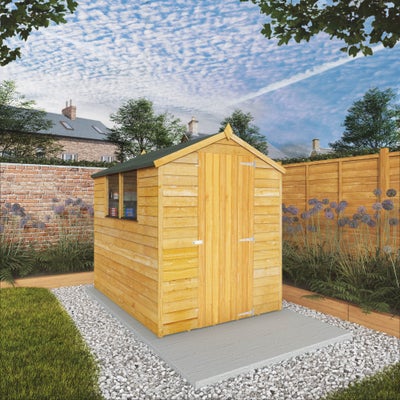
APEX
An apex roof features a central peak where two wooden roof sections meet. This classic design is perfect if you plan to work inside your shed, as the roof provides optimum head height.
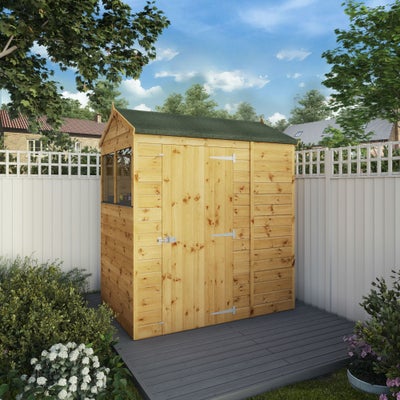
REVERSE APEX
A reverse apex shed features a central high point where the two wooden panels meet. However, the roof runs horizontally from side to side, providing generous headroom and a spacious working area.
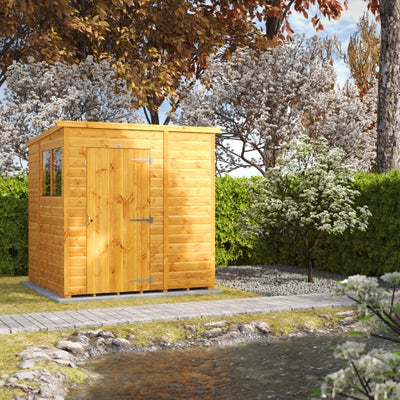
PENT
Featuring a flat single panel sloping from front to back, the pent roof provides sufficient height for the door while aiding in water run-off. This design is perfect for placement near a wall or fence.
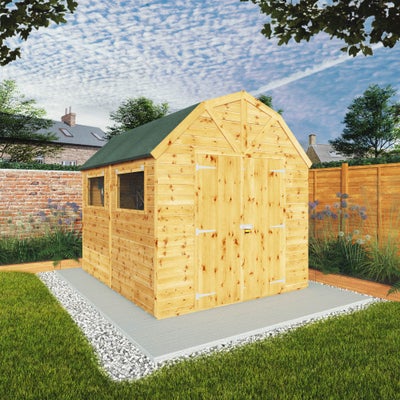
BARN
The barn is the most traditional of all shed shapes. This is a great option to store items which require vertical space, as the barn design supplies considerable internal height.
Choosing the material of your shed
Sheds are traditionally built using wood, as it is an excellent material to manufacture, easy to customise and is visually appealing in gardens. However, there are now various material options available, each with their own advantages and disadvantages. These are broken down in the table below to help you choose the right material for your shed.
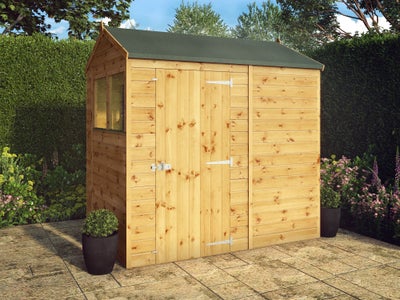
Wooden
A classic wooden shed offers a timeless, premium and hard-wearing finish. It is also incredibly versatile and easy to customise.
- Ideal use - Storage, workshop or leisure space
- Maintenance - annual treatment, regular checks for damage to timber, roof re-felting
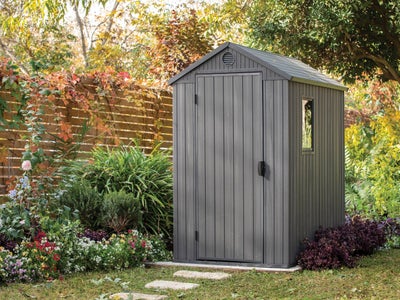
Plastic
A plastic shed provides a strong and affordable solution that is both practical and long-lasting.
- Ideal use - storage
- Maintenance - virtually maintenance-free
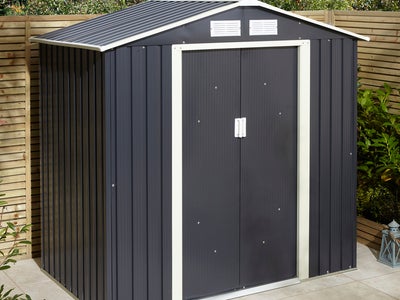
Metal
Metal sheds provide a long-lasting, virtually maintenance-free storage solution. They are also available in a variety of colour options to complement any garden.
- Ideal use - storage
- Maintenance - virtually maintenance-free
Wooden shed options
If you decide that a wooden shed is the best fit for your garden, there are several options to consider to ensure that your shed meets your specific requirements. Various cladding options and roof and floor materials are outlined below to help you choose.
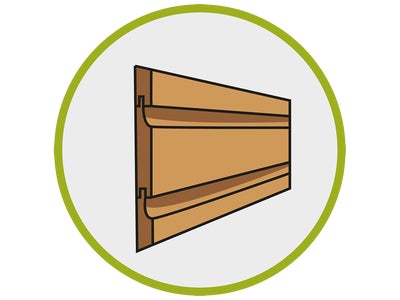
Shiplap
Shiplap cladding is manufactured using thick, interlocking tongue and groove boards with a shiplap profile. This creates a tight seal against water ingress and is a strong and durable option.
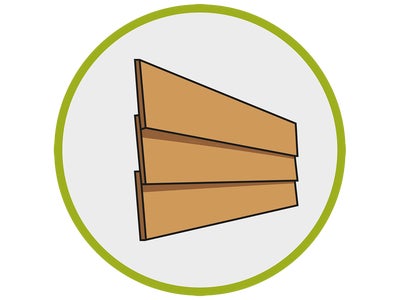
Overlap
Overlap cladding is manufactured using overlapping timber panels which are nailed to vertical, internal framing. Overlap cladding is the easiest and cheapest construction.
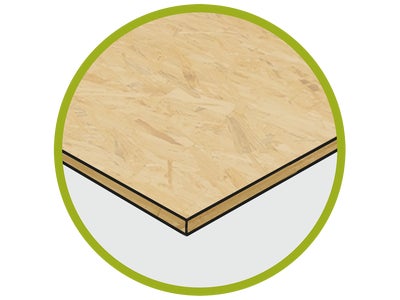
Solid sheet board
This material is perfect for everyday use and forms a strong base or ceiling for a wooden garden building. Engineered by compressing layers or oriented strands of wood to form a strong and robust panel, this material is perfect for general use.
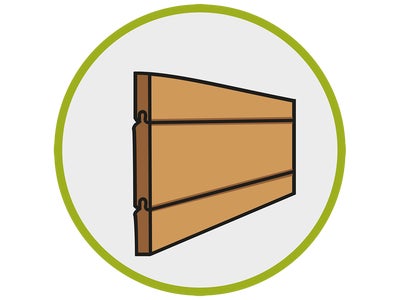
Tongue & groove
Tongue and Groove boards are constructed with interlocking timber boards which form a tight seal and help to support the weight of equipment and tools within the building. Perfect for frequent use, this material is recommended if you plan to spend substantial time inside the building or if you intend to store heavier items.
Budget
Budget considerations play a significant role when choosing a shed, and it’s essential to be realistic and identify the most important factor for your shed. We’ve highlighted the key differences between value sheds and premium ranges to help point you in the right direction.
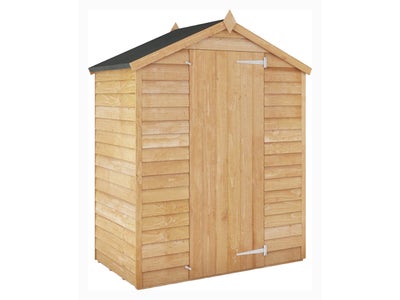
Overlap
Our overlap sheds are our cheapest range and are perfect for storing garden equipment and tools. However, this range would not be ideal for those who plan to spend a lot of time inside the shed. Solid sheet board roof and floor.
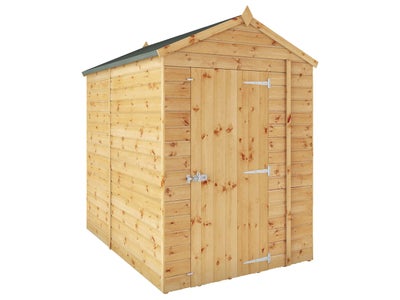
Shiplap
Shiplap sheds are strong, robust and will offer more weatherproofing than overlap sheds. This range is designed to support frequent use and is perfect for storing bulky and heavy equipment. Tongue and groove roof and floor.
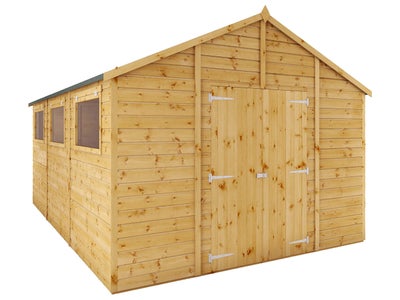
Premium shiplap
Our premium shiplap sheds are designed for those looking for a superior storage space. These garden buildings make excellent workshops and can easily support heavy use and large equipment. Tongue and groove roof and floor.
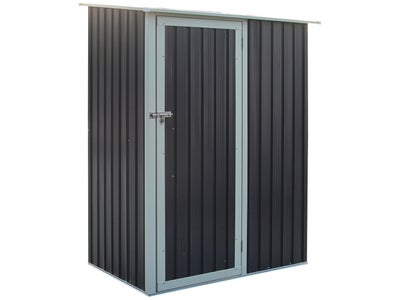
Metal
Metal sheds are a great choice for those looking for a low-maintenance, hassle-free storage space. The sturdy, windowless design of this range helps to keep your belongings safe and secure. Metal roof, floorless.
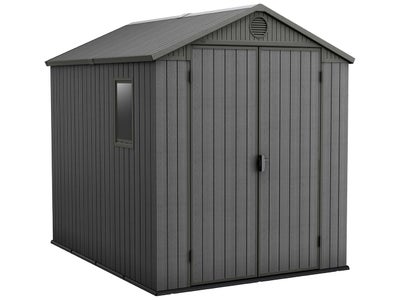
Plastic
Plastic sheds are a low-maintenance, hard-wearing storage solution. Constructed using high-strength panels, these sheds keep belongings safe and out of sight. Plastic cladding roof and floor.
Maintenance
Regardless of the type of shed you choose, it is important to note that regular maintenance is necessary to ensure its longevity and functionality. Maintain your shed by regularly clearing debris and checking for damp and mould. If you’re looking for a low-maintenance building we would suggest a plastic or metal shed, as these don’t require any treatment.
Our wooden garden buildings all have a treatment applied before leaving the factory which determines how much maintenance it will need. However, all wooden buildings require a preservative and waterproofing topcoat to be applied once installed and annually thereafter to validate your anti-rot guarantee.
Dip treatment
Our buildings are dip treated during manufacture as standard. This process sees a water-based colourant applied to the timber for protection whilst in storage and transit. However, this is not a preservative, therefore the building requires a preservative and waterproofing topcoat application once installed and annually thereafter. This then validates your 10 year anti-rot guarantee.
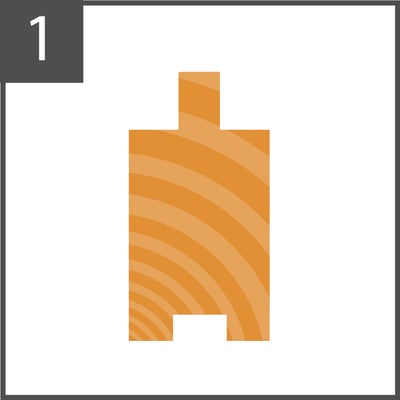
Timber is cut ready for treatment.
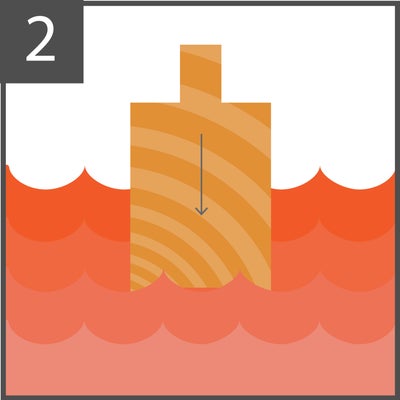
Timber is dipped into a cylinder containing preservative.
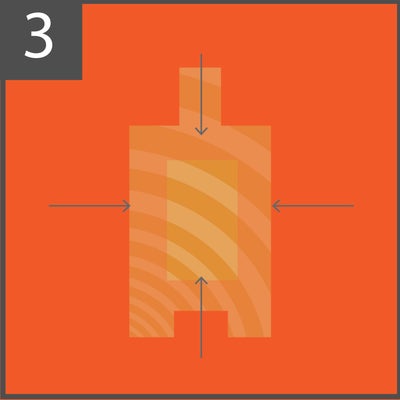
Preservative is absorbed into the surface of the timber.
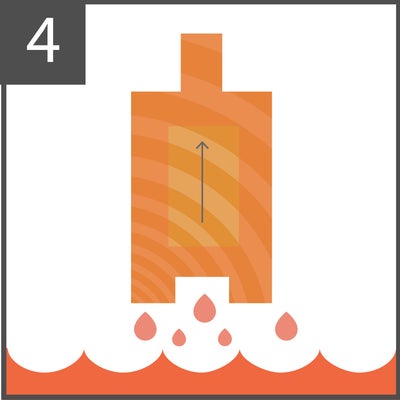
Timber is removed from preservative cylinder and left to air dry.
Pressure treatment
This is a high pressure chemical process designed to preserve exposed timber by providing optimal protection against insect attack, fungal attack and decay. The pressure treatment process drives preservative chemicals deep into the timber fibres. However, pressure treated buildings also require a preservative and waterproofing topcoat application once installed and annually thereafter. This then validates your 15 year anti-rot guarantee.
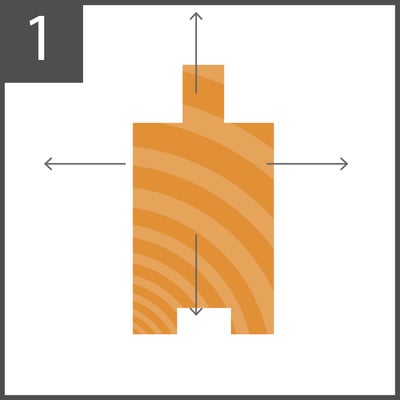
Timber is loaded into a chamber and a vacuum empties timber cells of air.
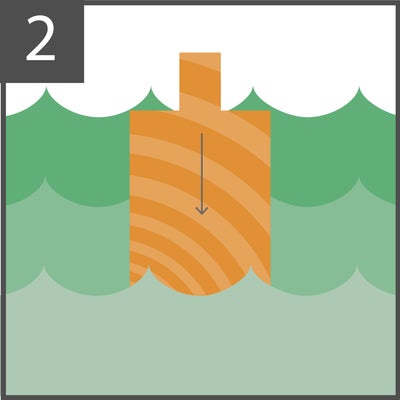
Timber is flooded under vacuum with preservative.
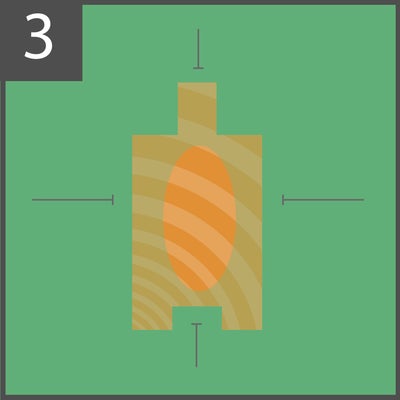
Preservative is forced deep into timber using hydraulic pressure.
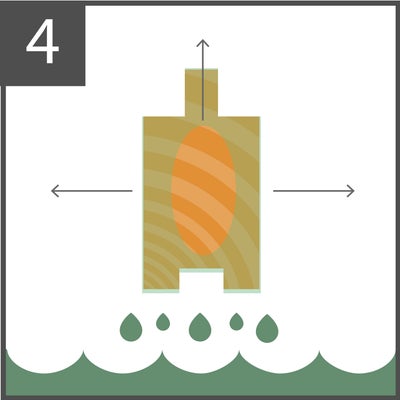
Another vacuum extracts excess preservative and timber is left to dry under low pressure.
